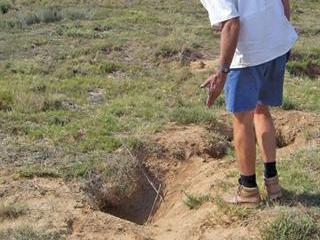Pineapples were introduced to the Eastern Cape during the 1870s and since then, many agricultural families in the area have taken to pineapple farming, including the Bradfields of Limestone Hill near Bathurst. When in late 2006 it was discovered that an Eastern Cape shipment of canned pineapples to Switzerland had unacceptably high levels of cadmium in terms of European Union standards, the hard work of generations of pineapple farmers threatened to come undone.
“We got a call from one of our buyers in Switzerland who said they’d detected cadmium,” recalls Jono Bradfield. “We’d never even heard of it.” Cadmium, a heavy metal, had contaminated vast tracts of pineapple fields in the Eastern Cape and this brought the pineapple canning industry of the area to a virtual standstill with most of the fruit having to be used for less profitable juicing, as cadmium levels are diluted via the juice blending process.
Further investigation revealed that a Chinese-produced zinc sulphate fertiliser, distributed by Omnia (Pty) Ltd and unwittingly used by farmers, was responsible for the contamination. Despite a process of litigation and various proposed rescue plans for the industry, growers like Jono braced themselves for an overnight collapse of the industry. “We had been canning 80% of our crop and juicing 20%.
Now we were forced to juice 100%. I have also since reduced my plantings by 60%,” he explains. Changing tack Caught up in the predicament of their main source of income having dried up, pineapple farmers began the difficult task of investigating alternatives. “It’s hard to move out of such a familiar and historically successful industry,” says Jonno. “Many farmers on relatively small pineapple farms with no real alternatives decided to simply hope that things were going to get better.” Luckily for the Bradfields, they had about 1 800ha of land, which gave them enough scope to diversify.
Jonno has continued to supply pineapples for juice but has also started marketing dried pineapples and supplying Woolworths. Samples of dried fruit have also been sent overseas to gauge the market there. All the fruit used in the drying process is tested at a laboratory in Cape Town for chemical residues and only chemical-free fruit is used for processing, says Jono.
About 100t of raw pineapple are peeled, cored, sliced and dried every month to produce 6t of dried pineapple rings. Once dried in a special dryer, the slices are graded, packaged, weighed and then stored in a darkened cold room at 6ºC before distribution. The Limestone Hill pineapple drying process is currently becoming HACCP and Kosher accredited. Besides producing conventionally grown pineapples, Jono also produces limited amounts of organic pineapples.
This stems from the Bradfield’s association with Jaco Drost from ProVentus Sustainable Agriculture based in Paarl, an agricultural consultancy that determines what organic products are in demand. “We work from the market to the producer, looking at what the market requires, then finding producers and consulting with them in terms of production,” Jaco explains. “We then develop self-sustaining systems, using all the raw material in an environmentally friendly and sustainable manner.”
ProVentus also advised Jono to start organic butternut farming as an alternative and he jumped at the idea, despite his limited knowledge of vegetable production. “I didn’t even know what a butternut looked like!” he jokes. “Sheryl had one growing in the garden so I went and had a good look at it.” This year Limestone Hill produced organic butternuts from one block of 12ha under drip irrigation, while expansion to another 12ha is planned.
The two 12ha blocks will then produce butternuts in rotation with sweet potatoes, carrots and grass-cover crops. E“Each land will produce for two years and then have a year’s break with cover crop,” says Jono. Currently his butternuts are marketed via Eurofruits in Stellenbosch and are used to produce Purity organic baby food. Limestone Hill also produces organic compost to offset the huge increase in fertiliser prices. Jono and Jaco are excited at the prospects of the international platform.
“There is a developing export market, which makes it worthwhile to be producing organically,” says Jaco. Other alternatives on Limestone Hill that have been consolidated include game farming (hunting-based) and beef farming (calving 250 Beefmaster-cross-Angus cows), the renovation of the original 1820 settler cottage as a basis to develop eco-tourism on the farm, as well as the unusual option of rose geranium oil distillation. Contact Jonno on 082 772 0398 or Sheryl on 082 375 9567. |fw









